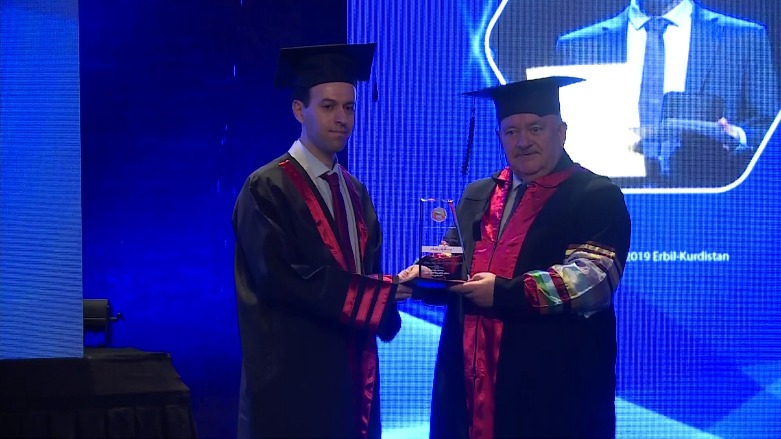Erbil’s Salahaddin University on Wednesday awarded an honorary doctorate to Caucher Birkar, an Iranian Kurd (Rojhilati) who in 2018 won the prestigious Fields Medal, often called "the mathematician's Nobel Prize."
A Cambridge University professor, Birkar was awrded the high honor in August during a ceremony at the International Congress of Mathematicians (ICM) in Rio de Janeiro, Brazil. The Fields Medal is given out every four years to a lucky few under 40 years old recognized as having made major contributions in the field of mathematics.
Speaking to the ICM, he said, “I’m hoping that this news will put a smile on the faces of those 40 million people,” in reference to the worldwide Kurdish population.
Birkar was born in the Kurdish city of Marivan (Mariwan), located on the border with the Kurdistan Region in Rojhilat’s Kurdistan Province. He studied mathematics at the University of Tehran before immigrating to the United Kingdom in 2000. He began a PhD a year after he was given refugee status and became a British citizen.
“I am delighted to be coming back to the Kurdistan Region again after nearly nine years,” Birkar told Kurdistan 24 on Wednesday shortly before a special ceremony in Erbil that was attended by senior Kurdistan Regional Government (KRG) officials, including Prime Minister Nechirvan Barzani.
“I am certain that every individual in Kurdistan is proud of this brilliant mathematician. I warmly commend Dr. Cochar all his past accomplishments and the great awards he has earned,” PM Barzani said in a speech during the event.
Following Barzani’s speech, Ahmad Dizayee, the director of Salahaddin University, presented Birkar with the honorary doctorate. Also among the audiences were Birkar’s parents, who, speaking with Kurdistan 24 in August, expressed great joy at the news of their son’s acclaim.
In a special speech he delivered after receiving the degree, he outlined his personal story of growing up in tumultuous times in Iran. He said his older brother, Haider, served as a role model and inspired curiosity in him as an “innovator.”
Birkar hoped that Kurdish youth and society, in general, would become more welcoming of outward expressions of passion for the sciences and mathematics.
Born Fereydoun Derakhshani, Birkar took on a new name shortly after arriving in the UK.
“I changed my name to Cauchar Birkar [Kurdish for "migrant mathematician"] because I wanted it to reflect my personality,” he added during the event, explaining that it is also meant to convey someone “voyaging through mathematics.”
Editing by John J. Catherine


